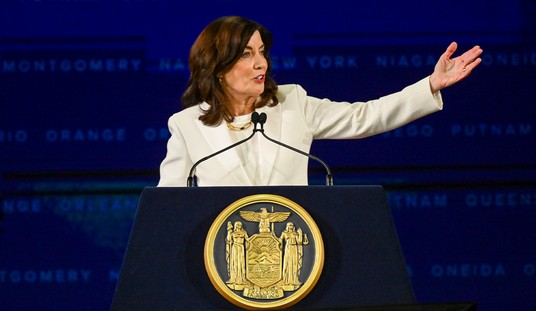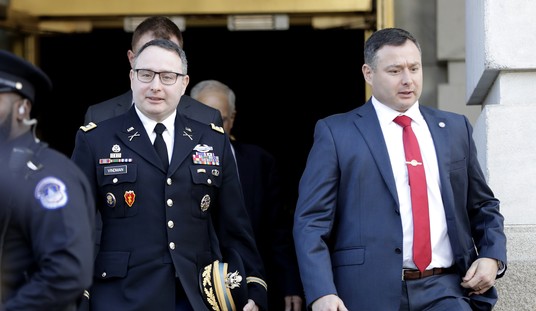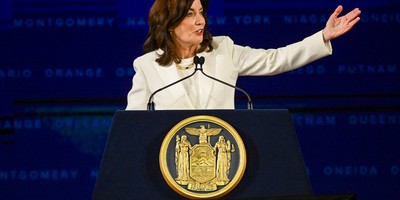By now you've had time to digest the news that after an extensive criminal investigation, the FBI will not recommend criminal charges against Hillary Clinton over her email scandal. While some partisans are preposterously hailing the conclusion as a vindication, it is absolutely nothing of the sort. Indeed, James Comey's methodical statement laid out a crushing indictment of Mrs. Clinton's conduct, her lack of regard for safeguarding national secrets, and her serial dishonesty throughout the entire contretemps. Before we specify the degree to which Comey's remarks obliterated numerous core lies upon which she and her team have relied for the last 16 months, a few thoughts on the his ultimate conclusion, and the optics surrounding it:
Like many, I was unsurprised by the decision; a reaction based on pure cynicism, as opposed to the facts of the case. Also like many, I'm more than a bit mystified by Comey's logic. He spelled out what sounded like a robust case for prosecution under the standard of "gross negligence," stating outright that in addition to Clinton's "extremely careless" behavior, "there is evidence of potential violations of the statutes regarding the handling of classified information." He went on to say, "for example, seven e-mail chains concern matters that were classified at the Top Secret/Special Access Program level when they were sent and received. These chains involved Secretary Clinton both sending e-mails about those matters and receiving e-mails from others about the same matters. There is evidence to support a conclusion that any reasonable person in Secretary Clinton’s position, or in the position of those government employees with whom she was corresponding about these matters, should have known that an unclassified system was no place for that conversation." Feel free to re-read both of those quotes.
"This is not to suggest that in similar circumstances, a person who engaged in this activity would face no consequences. To the contrary, those individuals are often subject to security or administrative sanctions. But that is not what we are deciding now," he added. What he means by this, it appears, is that other senior government officials would face serious sanctions (firing, stripping of clearances, fines, etc.) for this sort of conduct, but that such measures are beyond the purview of the FBI's probe. Plus, since Clinton is not a government employee at the moment, those options don't necessarily apply to her. The crux of the public justification for not recommending a prosecution seems to be that other somewhat comparable instances of high-ranking officials facing an indictment have hinged on intentional malfeasance, which the FBI says it can't prove here. While it's true that pursuing a "gross negligence" case does not require evidence of malicious intent, some have argued that pursing doing so against Clinton without pointing to willfulness would be a departure from precedent. But Hillary intentionally ordered the implementation of her rules-violating and national security-endangering email scheme, and lied about why she did it. Furthermore, she was personally and specifically warned twice about the grave risks she was creating, yet she carried on anyway. If those actions do not constitute willful intent and at least gross negligence, what would?
Recommended
As for optics, many Americans -- including millions who do not support him -- will agree with Donald Trump's initial reaction that these developments merely expose a hopelessly "rigged" system. There is a prevailing sense that the elites play by different rules than everyone else, and Clinton skating without a single charge only cements that sentiment. Whether or not one believes that 'the fix was in,' it's impossible not to raise an eyebrow at the events of the last few days. First, Loretta Lynch met privately with Bill Clinton in that much-discussed, secretive tarmac meeting. To be clear, this was the top law enforcement officer in the land huddling with the husband of a woman under federal investigation (to say nothing of the Clinton Foundation investigative angle), with the controversy's legal denouement looming. Even many Democrats couldn't defend that startlingly arrogant appearance of impropriety. Then, the FBI's announcement foreclosing a criminal prosecution arrived literally hours before Lynch's boss, the president, campaigned side-by-side with Mrs. Clinton for the first time. It doesn't take an irrational, conspiratorial fever swamp dweller to look at that fact set and start to wonder. Now, onto the wrecking ball Comey took to Hillary's email scandal assertions. Here's a very tough, accurate take from the Washington Post's Chris Cillizza:
Here's the good news for Hillary Clinton: The FBI has recommended no charges be brought followings its investigation of the former secretary of state's private email server. Here's the bad news: Just about everything else. FBI Director James Comey dismantled large portions of Clinton's long-told story about her private server and what she sent or received on it during a stirring 15-minute news conference following which he took no questions. While Comey exonerated Clinton legally speaking, he provided huge amounts of fodder that could badly hamstring her in the court of public opinion...It's hard to read Comey's statement as anything other than a wholesale rebuke of the story Clinton and her campaign team have been telling ever since the existence of her private email server came to light in spring 2015...Those are facts, facts delivered by the Justice Department of a Democratic administration. And those facts run absolutely counter to the narrative put forth by the Clinton operation: that this whole thing was a Republican witch-hunt pushed by a bored and adversarial media...So, while dodging an indictment is a good thing — she isn't under criminal investigation and remains a candidate — it's a far different thing from being cleared (or even close to it) in the court of public opinion. For a candidate already badly struggling on questions of whether she is honest and trustworthy enough to hold the office to which she aspires, Comey's comments are devastating.
We have covered Mrs. Clinton's verifiable email scandal lies in great depth, over the course of many months. Her official story has now been officially destroyed -- unrooted and shredded -- by the director of the Federal Bureau of Investigation. Several central assertions have been "systematically dismantled" and disproven once and for all:
(1) The lie: She did not send or receive any emails containing material that was classified at the time. The truth: "From the group of 30,000 e-mails returned to the State Department, 110 e-mails in 52 e-mail chains have been determined by the owning agency to contain classified information at the time they were sent or received. Eight of those chains contained information that was Top Secret at the time they were sent; 36 chains contained Secret information at the time." In other words, she did send and receive dozens of emails that were classified -- not retroactively, but at the time they were transmitted. Comey also explained why her "not marked classified" excuse is garbage. In addition, we know that at least a small handful of her emails were marked classified, which Comey also acknowledged. Every iteration of her 'classified material' excuse was flat-out false.
(2) The lie: She turned over all work-related emails, and the emails she and her lawyers unilaterally deleted had nothing to do with official business. The truth: "The FBI also discovered several thousand work-related e-mails that were not in the group of 30,000 that were returned by Secretary Clinton to State in 2014....With respect to the thousands of e-mails we found that were not among those produced to State, agencies have concluded that three of those were classified at the time they were sent or received, one at the Secret level and two at the Confidential level...The lawyers doing the sorting for Secretary Clinton in 2014 did not individually read the content of all of her e-mails, as we did for those available to us." So she didn't turn over all of her work emails (and her lawyers apparently didn't read all of the messages they erased, contrary to yet another false campaign claim). In fact, three of the thousands (!) she deleted were classified -- again, from the point of origination. And here's the kicker from Comey: "It is also likely that there are other work-related e-mails that they did not produce to State and that we did not find elsewhere, and that are now gone because they deleted all e-mails they did not return to State, and the lawyers cleaned their devices in such a way as to preclude complete forensic recovery." It's "likely" that additional work emails were permanently deleted and wiped away by Clinton's team of attorneys. It looks like the FBI managed to recover some of the erased content, but not all of it. We'll never know the full extent of the sensitive material they destroyed.
(3) The lie: Her private server didn't endanger national security and was not breached by foreign intelligence agencies or other hackers. The truth: Comey allows that the Bureau didn't find unequivocal evidence of a breach, but the unsubtle circumstantial case he offers leaves little doubt that he agrees with assessments from the former Secretary of Defense and former Deputy CIA Director. Namely, that "hostile actors" almost certainly accessed her email system, which held many high-level US secrets:
This means: "Yeah, we can't directly prove it, but you can be pretty sure it happened." pic.twitter.com/RS719HZSge
— Tom Nichols (@RadioFreeTom) July 5, 2016
(4) The lie: She set up the server scheme as a matter of convenience, in order to facilitate accessing her emails from a single mobile device. The truth: "I have so far used the singular term, 'e-mail server,' in describing the referral that began our investigation. It turns out to have been more complicated than that. Secretary Clinton used several different servers and administrators of those servers during her four years at the State Department, and used numerous mobile devices to view and send e-mail on that personal domain." She used multiple servers (new information), and numerous mobile devices (old information). The purpose of the unsecure private servers, as revealed in the blistering State Department Inspector General report, was to tightly control access to her virtual paper trail. Ahem:
Court: Federal officials can not use private mail accounts to evade public records laws https://t.co/Iw6NJrJOt3 pic.twitter.com/iFwG9LuUxy
— The Hill (@thehill) July 5, 2016
Prosecution or no, Hillary Clinton put extremely sensitive national security secrets at risk through her reckless, exclusive and self-interested use of a shockingly non-secure email server. And she lied about it. Repeatedly. Those are facts. She is ethically unfit for the presidency. I'll leave you with this brutal mash-up from Reason TV,
which is a nice complement to our own:

























Join the conversation as a VIP Member